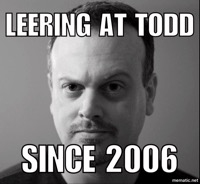| View previous topic :: View next topic |
| Author |
Message |
Nelson Jewell
Guest
|
 Posted: Thu Dec 04, 2008 3:07 am Post subject: Processing secrets/methods Posted: Thu Dec 04, 2008 3:07 am Post subject: Processing secrets/methods |
 |
|
Something I've noticed while listening to talent demos, especially those working in the national caliber arena, is that the audio has a clarity, kick, and loudness that makes them stand out but not in an irritating way.
My question to the tweaks who post here: What methods of processing/equipment/plug-ins are being used to get that "sound?" |
|
| Back to top |
|
 |
Edo
Guest
|
 Posted: Thu Dec 04, 2008 5:39 am Post subject: Posted: Thu Dec 04, 2008 5:39 am Post subject: |
 |
|
Nelson,
There is no easy answer to your question, but in general... whether or not the demo sounds crisp, loud and 'in your face' (whatever that may be) is probably the set of ears the soundguy has that did the final mastering. What tools he uses is of lesser importance IMHO.
Obviously there will be some EQ and definately some compression going on. I can name you a few plug-ins used for that purpose, but I doubt it would clarify things. As always... it's the driver, not the car. And let's not forget... also a matter of taste. |
|
| Back to top |
|
 |
Jowillie
Lucky 700
Joined: 20 Aug 2006
Posts: 714
Location: North Carolina
|
|
| Back to top |
|
 |
Rob Ellis
M&M

Joined: 01 Aug 2006
Posts: 2385
Location: Detroit
|
 Posted: Thu Dec 04, 2008 7:29 am Post subject: Posted: Thu Dec 04, 2008 7:29 am Post subject: |
 |
|
The only processing I do is some light compression (Compander setting in Audition)....for auditions. No EQ or anything else. The rest I leave to the engineers who really understand mastering. As an old radio guy I know just enough to be dangerous.
And yes, JoWi, less is more. When I listen to some of my earlier, way overcompressed work of a few years ago, it almost hurts my ears! |
|
| Back to top |
|
 |
Lance Blair
M&M

Joined: 03 Jun 2007
Posts: 2282
Location: Atlanta
|
 Posted: Thu Dec 04, 2008 9:12 am Post subject: Posted: Thu Dec 04, 2008 9:12 am Post subject: |
 |
|
That "sound" is usually a good talent in a good room with a great preamp. The mic doesn't have to be amazing.
I find that a less is more with compression, but more compression can come into play if you're not on top of the mic in the first place and don't have a lot of proximity effect. A good full sounding voice 8"-12" from the microphone (or more) can take a lot of compression in very nice ways. When you eat the mic, not so much.
If I'm wearing the engineer's hat for various reasons (usually e-learning with consultation from the client), I like a tamed down version of AA3's compander (I also have a smoother plugin for that too - it was free, and now it's not!  ) and I have a couple of other free VST compression plugins (Slim Slow Slider and Kjaerhus - sp?) that I like to run but not drive too hard. Then if you still want to limit and bring it all up, use a limiter only on the master channel, never on the individual tracks. Even if you just have a mono voice track, limiting works best on the master. ) and I have a couple of other free VST compression plugins (Slim Slow Slider and Kjaerhus - sp?) that I like to run but not drive too hard. Then if you still want to limit and bring it all up, use a limiter only on the master channel, never on the individual tracks. Even if you just have a mono voice track, limiting works best on the master.
I also find plugins work best at 44/16 resolution unless you've got a very powerful computer...to keep things in a home voice over studio perspective.
Once you notice the compression, it's time to dial it back. Acoustics and preamps will help the fullness and presence of the sound more than any processing can on that end of things. There are too many good mics - some that work better on some voices than others to say that is what makes the difference. Good mics on mediocre preamps are like fine meals served on paper plates.
_________________
Skype: globalvoiceover
and now, http://lanceblairvo.com the blog is there now too!
Last edited by Lance Blair on Thu Dec 04, 2008 9:25 am; edited 1 time in total |
|
| Back to top |
|
 |
Yoda117
M&M

Joined: 20 Dec 2006
Posts: 2362
Location: Philadelphia, Pennsylvania
|
 Posted: Thu Dec 04, 2008 9:25 am Post subject: Posted: Thu Dec 04, 2008 9:25 am Post subject: |
 |
|
| Jowillie wrote: | | Someone start the discussion about "Less is More" for audio processing. |
I'll do one better.
What methods of processing/equipment/plug-ins are being used to get that "sound?"
My response to this is, "how do you get to play at Carnegie Hall?"
Practice.
Practice.
Practice.
Most people recording VO at home have do not have the same recording chain, so what they're going to do is different. No two people have the same voice, so their needs will also be different. If you're going to edit, mix, and master your own stuff (dynamic processing is used in many of these steps), then you need to know your chain and DAW. Some things will be relatively common (use of 2:1 ratio for compression on VO is pretty standard), but no rules apply to all.
Know your gear, know thyself, and in 100 auditions you will be successful (if Sun Tzu was a voice actor, this would have probably been what he said).
As far as the audio processing itself, most folks have a tendency to use more than is needed. The "more is less" comment often comes out because of this. Jowillie, made the studio engineer's mantra of "less is more" for a good reason. As a voice actor gets better, you'll find that engineers need less and less time to tweak with things to get a good track out of their performance. For the folks doing this at home, the less processing you subject your tracks to, the more of you the audience gets to hear from the performance... and that's why you got the booking in the first place, right?
What kind of stuff do you have in your studio? If folks here are using the same stuff, they'll be better able to tell you what settings work for them (please notice that it works for them, and not necessarily you). I'm not going to tell you what settings I use on my Trakkers if you're using an RNC. The two are totally different devices and behave differently at different settings (the RNC doesn't even have some of the Trakker's settings which doesn't mean that it's any less important of a tool, but that it's a different tool with different characteristics).
Okay, I've got a flight to catch, so you guys & gals have fun with this

_________________
Voiceovers by Gregory Houser
Philadelphia based Voice Actor
Blog - A man, a martini, and a lot of microphones |
|
| Back to top |
|
 |
Lance Blair
M&M

Joined: 03 Jun 2007
Posts: 2282
Location: Atlanta
|
 Posted: Thu Dec 04, 2008 9:27 am Post subject: Posted: Thu Dec 04, 2008 9:27 am Post subject: |
 |
|
Yeah, what Yoda117 said...it is all about the voice.
_________________
Skype: globalvoiceover
and now, http://lanceblairvo.com the blog is there now too! |
|
| Back to top |
|
 |
Philip Banks
Je Ne Sais Quoi

Joined: 20 Jun 2005
Posts: 11083
Location: Portgordon, Scotland
|
 Posted: Thu Dec 04, 2008 11:43 am Post subject: Posted: Thu Dec 04, 2008 11:43 am Post subject: |
 |
|
I turn on my MKI 48 year old Philip Banks 19 years experienciator ......
(Moment of complete lack of humility there) .... Heap on the shame I can take it. |
|
| Back to top |
|
 |
Rob Ellis
M&M

Joined: 01 Aug 2006
Posts: 2385
Location: Detroit
|
 Posted: Thu Dec 04, 2008 11:52 am Post subject: Posted: Thu Dec 04, 2008 11:52 am Post subject: |
 |
|
| Can I get one of those from Sweetwater or Mercenary Audio??!! |
|
| Back to top |
|
 |
Frank F
Fat, Old, and Sassy

Joined: 10 Nov 2004
Posts: 4421
Location: Park City, Utah
|
 Posted: Thu Dec 04, 2008 12:05 pm Post subject: Posted: Thu Dec 04, 2008 12:05 pm Post subject: |
 |
|
This goes back to several discussions on processing and to reiterate the former; when sending audio out to a Producer for post - use no compression. Send a good clean flat file of audio.
Let the producer choose to make the decisions as to how the audio should be processed. The concept of pre-processing a file before the producer has a chance to hear comes from people who produce for radio. This sound is fine when the final product will be heard only on radio, but has definite limitations when the audio will be used for another form of media.
If the audio leaving your studio is processed, the loudness factor may be too much or too little in comparison to other sections of audio in the final production. Mis-matched audio levels can wreak havoc in post, so be very careful when delivering audio. Less IS more, clean is better.
Toodles
F2
_________________
Be thankful for the bad things in life. They opened your eyes to the good things you weren't paying attention to before. email: thevoice@usa.com |
|
| Back to top |
|
 |
todd ellis
A Zillion

Joined: 02 Jan 2007
Posts: 10539
Location: little egypt
|
 Posted: Thu Dec 04, 2008 1:39 pm Post subject: Posted: Thu Dec 04, 2008 1:39 pm Post subject: |
 |
|
i'm not as smart as many here --- however - i send EVERYTHING completely unprocessed. most of the producers i work with demand it that way. plus ... it's easier for me.
_________________
"i know philip banks": todd ellis
who's/on/1st?
 |
|
| Back to top |
|
 |
Bill Campbell
DC

Joined: 09 Mar 2007
Posts: 621
|
 Posted: Thu Dec 04, 2008 2:13 pm Post subject: Posted: Thu Dec 04, 2008 2:13 pm Post subject: |
 |
|
For fully produced TV/Radio audio - which is 90% of what I do, I use two LIGHT passes ofcompression and EQ. But, it all depends on the type of commercial.
It's like cooking - season to taste.
Outboard compressors and EQs generally sound better and more pleasing to the ear. I use an Aphex Compellor and an Aphex Exciter/Big Bottom for final mixes, mostly auto and furniture retail.
When I do VO only, I'll compress and EQ to make my voice sound it's best,
yet not so colored that the end producer can't adjust for his needs.
"If you hear the compression, it's too much".
_________________
www.asapaudio.com |
|
| Back to top |
|
 |
Nelson Jewell
Guest
|
 Posted: Thu Dec 04, 2008 3:55 pm Post subject: Posted: Thu Dec 04, 2008 3:55 pm Post subject: |
 |
|
It's great to hear input from everyone. I'm certainly familiar with the "less is more concept," sending producers flat/unprocessed audio (which I always do), and practice, etc. On occasion I will produce a product in its entirety, like my own demos. I was simply searching for personal processing recipes.
I've heard of engineers that have their own signature sound when producing audio (songs, etc.) Also, I remember an online conversation with Joe Cipriano a while ago...he stated that the best his voice ever sounded was at an
in-studio session. He regretted not asking the engineer what he used for equipment, plug-ins, settings, etc. after the session. |
|
| Back to top |
|
 |
Jeffrey Kafer
Assistant Zookeeper

Joined: 09 Dec 2006
Posts: 4931
Location: Location, Location!
|
|
| Back to top |
|
 |
Rob Ellis
M&M

Joined: 01 Aug 2006
Posts: 2385
Location: Detroit
|
 Posted: Fri Dec 05, 2008 9:34 am Post subject: Posted: Fri Dec 05, 2008 9:34 am Post subject: |
 |
|
So is there a way to silence the dead spaces in a read, without compressing the rest of it?
I mainly use compression to silence the background hiss that is there(between words)... sometimes after I amplify the volume. Usually I amplify the original by about 6db.
But if I could clean that up without compressing, that might be better. |
|
| Back to top |
|
 |
|



 ) and I have a couple of other free VST compression plugins (Slim Slow Slider and Kjaerhus - sp?) that I like to run but not drive too hard. Then if you still want to limit and bring it all up, use a limiter only on the master channel, never on the individual tracks. Even if you just have a mono voice track, limiting works best on the master.
) and I have a couple of other free VST compression plugins (Slim Slow Slider and Kjaerhus - sp?) that I like to run but not drive too hard. Then if you still want to limit and bring it all up, use a limiter only on the master channel, never on the individual tracks. Even if you just have a mono voice track, limiting works best on the master.

